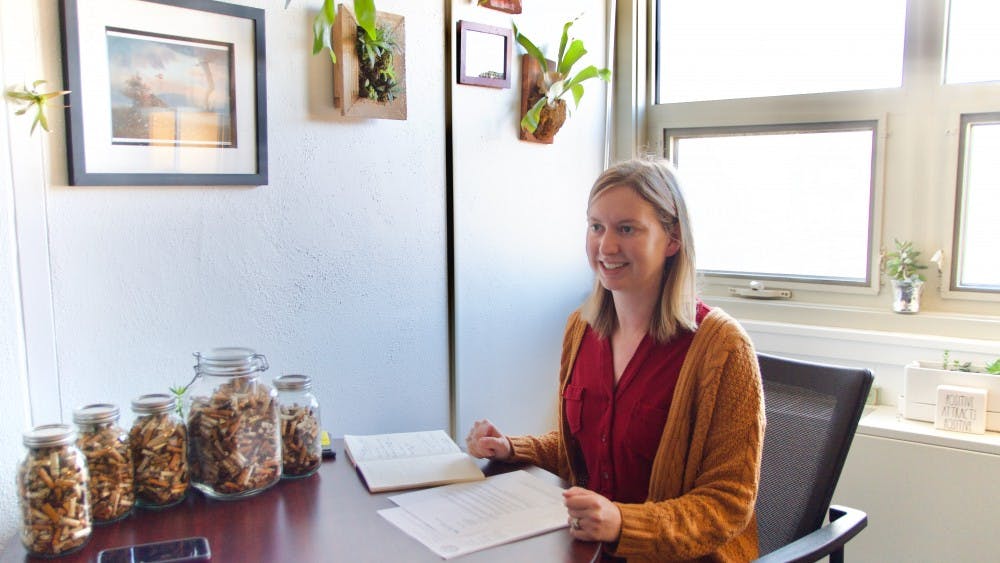If you walk across campus, it’s no secret that the Smoke Free UB Policy isn’t enforced.
Outside Lockwood Library, Capen Hall or pretty much any building on North Campus, countless students, faculty and staff smoke cigarettes throughout the day. Since UB is technically a smoke-free campus, there are no receptacles to throw away butts and thousands of finished cigarettes are littered across campus.
That’s why community health and health behavior professor Jessica Kruger decided to collect cigarette butts from across campus to show administrators that UB is in fact not smoke-free and that something needs to change.
Kruger told her Introduction to Public Health class that she’d give them extra credit points if they went around campus, picked up cigarette butts and brought them in to class. She had a mason jar she wanted to fill and bring to UB President Satish Tripathi to prove that the policy needs an update.
“I saw [students smoking on campus], but I didn’t know the impact. So I thought it would be a good idea to collect data on cigarette butts on campus,” Kruger said. “Frankly, many of my students were really jazzed by this. The first day, the jar was half full, and I thought we might fill that one jar. As they started coming in, I had to put them all in garbage bags and then buy more jars to fill them. I was completely blown out of the water with how many butts students actually collected.”
Kruger now has five mason jars filled with butts. She even had a friend at SUNY Fredonia make an app to track the data. Using geographic information systems, the app lets students check into a location on campus and enter how many butts they found at the location. The app then creates a heat map showing which areas on campus have the highest density of littered butts.
She plans on bringing the jars and some students that participated in the survey to Tripathi’s office later this semester to present her findings and discuss possible revisions to the policy, which turns 10 years old next year.
Sophomore environmental engineering major Grace Sheckler was shocked when Kruger said she would present her findings to Tripathi. Sheckler collected 11 butts for Kruger’s class. She hopes bringing them to the president’s office will highlight the issue and be a catalyst for change
“Picking up the cigarette butts is good because the system isn’t working and if taking them to the top of the food chain is going to make the school recognize that, then that’s what [Dr. Kruger] will do,” Sheckler said. “By doing something that’s shocking like this, maybe we’ll see some changes and our campus will progress towards what it should be –– smoke free.”
UB created its smoke-free policy on Aug. 1, 2009, prohibiting smoking in all buildings and on all grounds — including parking lots and green spaces — on the university’s three campuses. UB revised the policy from 2009 to 2010, allowing smoking in areas of the parking lots that were more than 100 feet from buildings.
The policy states: “The University at Buffalo is committed to providing a healthy, comfortable, and safe smoke-, vape- and tobacco-free environment for its students, faculty, staff and visitors.”
But during the last eight years, the university has taken little initiative to prevent people from smoking. And the rising popularity of e-cigarettes and Juuls has presented a new set of issues for the Breathe Free UB Committee –– a group of more than 40 faculty, staff, students, alumni, union leaders and community health experts trying to enforce the policy –– to deal with.
The lack of enforcement disappoints Kruger from a public health standpoint. She said almost no policy is followed 100 percent, but thinks UB has room to grow when it comes to enforcing the policy.
“I worry about people that have asthma. I personally have allergies so breathing in cigarette smoke really bothers me,” Kruger said. “But also, people could be pregnant, people could be going through other health issues and we have to think about them. We have report after report that secondhand smoke causes disease, and we’re still learning about the health impacts of vapes. So it’s important to protect the community.”
UB put up 40 new “no smoking” signs, placed in “hot spot” areas across its three campuses this year, according to a letter from President Tripathi. But Kruger and her students don’t think the signs are effective.
Hannah Mechanic, a senior health and human services major, is a student in the class. She said University Police should hand out citations when they see people smoking on campus. She said if students are afraid of having to pay a fine for smoking on campus, she thinks less people would smoke.
“It’s like parking in an illegal spot. People are afraid of getting a ticket so they don’t do it,” Mechanic said. “When it comes to smoking, it should be the same. You’re harming people with secondhand smoke, so they should be held accountable.”
Mechanic said the university shouldn’t tell people to stop smoking outright, especially if people are addicted or come from another country where smoking is integrated into people’s lives. She suggested a designated smoking area far removed from the academic complex so people don’t have to breathe in secondhand smoke.
“We can’t force everyone to quit, so there should be a designated area, but it should be an inconvenient area of campus,” Mechanic said. “I mean that in the best way possible. By forcing people to go out of their way to smoke, maybe it would help them quit. Even still, we wouldn’t be a smoke-free campus, but at least that would be an improvement.”
Max Kalnitz is the senior news editor and can be reached at max.kalnitz@ubspectrum.com and on Twitter @Max_Kalnitz





